Covid in Wales: Behind the politics of the pandemic
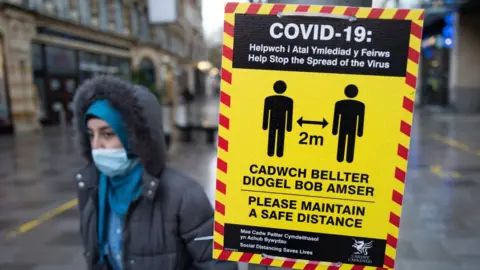 Getty Images
Getty ImagesIn February last year, when people brought coronavirus home to Wales from half-term holidays in Europe, things "got much more real very, very quickly", Health Minister Vaughan Gething says.
The first Welsh case was confirmed on 28 February in someone who had been to northern Italy.
Preparations ramped up over the next two weeks. By 13 March routine NHS work was put on hold.
But political opponents at the time said there was a lack of urgency. They wanted schools shut and big gatherings cancelled.
Even after the Welsh Rugby Union called off the match against Scotland on 14 March, ministers said their scientific advice did not show it would save lives.
After that weekend the situation changed.
Startling research said the NHS would face colossal pressure without drastic action.
The following Monday - the day Wales' first coronavirus-related death was announced - Mr Gething was at an emergency UK government meeting in Whitehall.
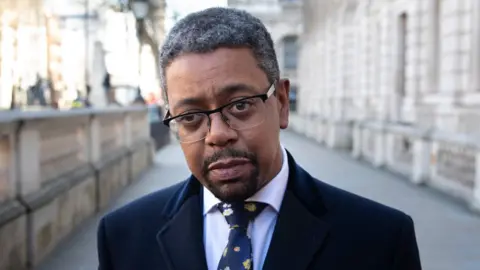 Getty Images
Getty ImagesEven before then he says "we knew that we were going to have a significant impact, but didn't still understand quite how big an impact it would have at that point".
Mr Gething recalls being shown papers in an emergency briefing room at the Welsh government's headquarters in Cathays Park, Cardiff.
"Eye-watering numbers" were being talked about, he says.
"The reasonable worst case scenario was genuine apocalypse - you know, hundreds of thousands of deaths in a year."
So did they miss an opportunity to act sooner?
An earlier lockdown could have saved more lives, Mr Gething says, but he can't say when it ought to have happened.
"At that time we made choices based on the best evidence and science," he says.
"If we had the evidence we have now, we would make different choices.
"I think we'd have gone into lockdown earlier."
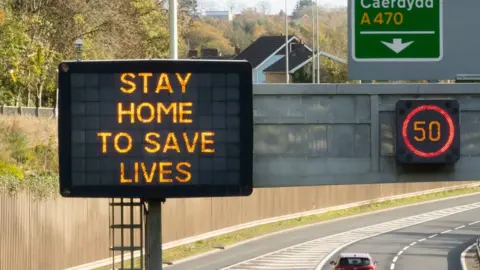 Getty Images
Getty ImagesConservative shadow health minister Angela Burns says the Welsh government could have acted more nimbly, for example by buying personal protective equipment (PPE) sooner.
"But, you know, we have got to remember this came out of leftfield," she says.
"We can look back with hindsight and say an awful lot of mistakes were made, but I think that in the heat of the moment, trying to work out what to do best, how serious it was, I think is a very difficult call."
Rhun ap Iorwerth, of Plaid Cymru, says the lockdown came too late, but he claims years of failing to prepare the health and care sector meant the crisis hit harder.
"These are the issues that were deeply, deeply ingrained and they came back to bite us in a horrific way that we've learned over the past year," he says.
Welsh Liberal Democrat leader Jane Dodds says the devolved administrations had limited room to manoeuvre last spring.
"I think it would have been very difficult for us to have made a unilateral decision at that point," she says.
"We are an island and we have to operate in that way."
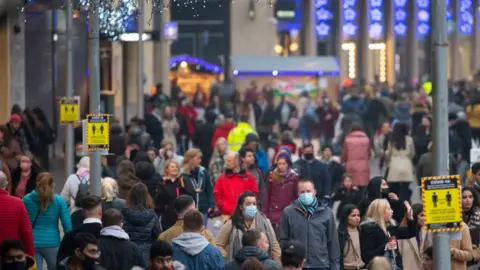 Getty Images
Getty ImagesTesting
In March and April, more than a thousand patients were discharged from hospital into care homes without a test.
By the time routine testing was introduced in care homes last April, many had suffered devastating losses.
The same policy of discharging without a test, described by a Commons report as an "appalling" error, was adopted in England.
But Mr Gething rejects the findings of a Senedd committee which concluded care homes were "badly let down" because the government responded too slowly.
"I think the health committee were wrong", the minister says.
He points to research that found coronavirus outbreaks in care homes could not be blamed on patients who were discharged to free up hospital beds. The size and type of home was a much bigger factor, it found.
Opponents are unconvinced.
The policy was "total lunacy", says Mrs Burns, while Mr ap Iorwerth says he has "no doubt" it was a mistake.
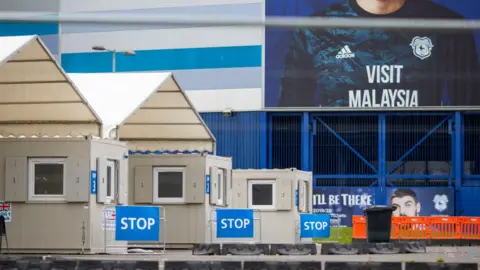 Getty Images
Getty ImagesBy now, Wales and the UK are among the best-performing nations for mass coronavirus testing, according to a report this month.
But it took until last summer to build a mass-testing system.
Mr Gething says Public Health Wales ordered testing material in January, but imports were "held up in other countries beyond our control".
Second wave
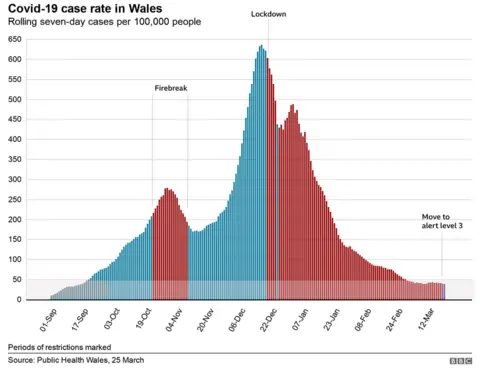

Local lockdowns and the Wales-wide firebreak in late October and November could not stop a second wave. They could only delay it.
For Plaid Cymru, Mr ap Iorwerth maintains a longer firebreak "would have been useful".
Mrs Burns, of the Welsh Conservatives, says there was "a little bit too much jumping around" between national and local restrictions in the autumn.
In December, First Minister Mark Drakeford said the firebreak "did everything we hoped it would" by suppressing the virus for three weeks, but a sense of "fatigue" meant not everyone was following the strict rules.
Soon it was clear a new more infectious variant was spreading rapidly, plunging the whole of the UK back into lockdown by Christmas.
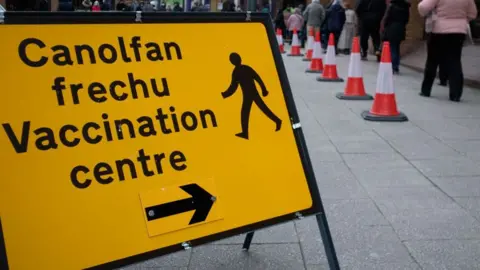 Getty Images
Getty ImagesVaccination
More than half of Welsh adults have had a first dose as part of one of the world's fastest vaccine programmes.
But Mrs Burns credits a "masterstroke" by Boris Johnson's UK government.
Last summer it started ordering big supplies of vaccines before it knew whether any of them would actually work.
The gamble has "paid off - and look at us compared to so many other parts of the world", Mrs Burns says.
Mr Gething also applauds the UK government's decision.
He says: "I think they have got a number of things wrong. But actually the way they went about looking to procure vaccines early, it was the right call."
What next?
Eventually there will be an inquiry into how the pandemic was handled.
Mark Drakeford says the Welsh government's actions should be scrutinised as part of a UK-wide inquiry.
But Mr ap Iorwerth says that's "dodging responsibility" and a Welsh inquiry is needed.
For the Liberal Democrats, Ms Dodds says there should be Welsh and UK inquiries, as do Conservatives in the Senedd.
What sort of inquiry and when are decisions for the winners of May's Senedd election.
But they'll have to keep battling the crisis too, says Mr Gething.
"With all the success that we've seen in our vaccination program there are still really difficult days ahead of us," he says.
"Whoever is the next government will have some very difficult choices to make if we're going to keep Wales safe."
